A New Era in Analytics With Google Analytics G4
Google Analytics G4 is a new analytics tool from Google that could have a big impact on European businesses operating online with Google tools in terms of privacy concerns.
G4 is going to replace the previous universal analytics tool and this includes many benefits, particularly with regards to privacy.
G4’s Privacy Upgrade
Europe’s General Data Protection Regulation (GDPR) data protection law forbids companies from sharing data with US institutions for privacy and confidentiality reasons.
The good news is that G4 is all about “prioritizing user privacy” while also maximizing the “complex, multi-platform journeys” of customers (Source: Google).
How Google Analytics G4 Changes the Game
According to Google, all universal analytics default platforms will no longer process new visits as of July 1, 2023, while Universal Analytics 360 platforms will stop processing visits on October 1 of the same year.
Customers should still be able to access their previously processed data on these platforms for at least six months from those dates.
The justification for the change is that Universal Analytics had been created for a generation of measurement anchored on the desktop web, that is, websites accessed mostly by computers and notebooks. In addition, Universal Analytics relied on cookies, files that record access data related to the visiting public and what they do.
In the company’s view, this measurement methodology is rapidly becoming obsolete. Google Analytics 4 operates on all platforms, does not rely on cookies only, and uses an event-based data model to provide user-centric measurement. (Source: Search Engine Journal).
Who Will Benefit Most From G4?
G4 Product Director Russel Ketchum said the new platform will be especially designed to aid businesses meet evolving needs and user expectations that enable better data collection and use.
He also pointed out that the tool will no longer store IP addresses. It reinforces that the product is more in line with recent international data privacy laws, such as GDPR for example.
According to some companies that have already tested G4, the new tool is better than its predecessor and lives up to the hype.
The industry understands that it is a strong evolution in terms of emerging demands, such as the concerns around cookies and data privacy.
In fact, cookies have been criticized for years because of the way they keep data from the public that has been considered somewhat invasive and unsafe.
With it, malicious entities can keep an eye on people’s habits, and hackers get information to create scams and cybercrimes. G4 largely does away with that risk. (Source: Sales Loves Marketing).
A New Era in Analytics
G4 uses statistical methods to create a data inference, something like the demographic groups measured in public opinion polls. It also has automatic anonymization of IP addresses and no indefinite data retention.
Thus, G4 considers every visitor interaction as a metric event (page views, link clicks, scrolls, video viewing, and file download…)
On the user side, the visual has an interface that shows the most relevant elements rather than static graphics. (Source: Neil Patel).
All in all, this spells a new era in analytics and will be a welcome change.
Tags In
Isabella Federico
Categories
- B2B (9)
- Design (1)
- Digital Marketing (4)
- Google (2)
- Google Ads (7)
- News (1)
- Uncategorized (34)




